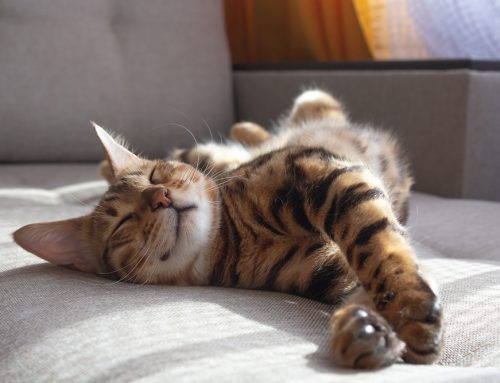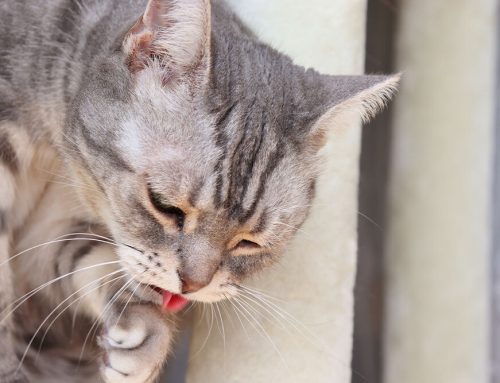As a recognized Cat Friendly Practice, Stack Veterinary Hospital is certified fanatical about feline health and wellbeing. That’s why we’re always troubled to hear about cats who are urinating outside their litter box—which often signifies physical or emotional distress.
Feline inappropriate urination is the number one complaint among cat owners, and a common reason for surrender to shelters and euthanasia. Indeed, this condition can be incredibly frustrating to treat without veterinary guidance. Therefore, we present five common reasons for inappropriate urination in cats.
Reason #1: Your cat’s health is impaired
Your cat’s litter box behavior accurately reflects their internal health. When cats are “feline-low,” one of the first things to change is their elimination habits. Cats with previously impeccable litter box manners may suddenly seem to forget their previous ways. But, this is not an act of spite or malice.
Pain or discomfort that occurs when your cat steps inside their box, postures to urinate, or the act of urination itself becomes associated with the cat’s environment—in this case, the litter box. The cat’s mind connects the location to the pain, and thereafter may avoid the box. Rapid diagnosis not only brings your cat much needed relief, but also prevents them from developing a preference for their new location or substrate, such as carpet, furniture, or clothing. Health conditions that can cause litter box change in cats include:
- Feline lower urinary tract disease (FLUTD)
- Feline idiopathic cystitis (FIC)
- Urinary or kidney stones
- Kidney disease (i.e., failure)
- Arthritis
- Diabetes
- Urinary blockage (i.e., an emergency condition identified by signs such as straining to urinate, vocalization, and a rigid abdomen)
In addition to urinary accidents, painful cats may have discolored, dilute, or bloody urine, and small urinations, or they may vocalize while urinating. Your Stack Veterinary Hospital veterinarian can diagnose these issues with a physical examination, urinalysis, and imaging (i.e., X-ray or ultrasound).
Reason #2: Your cat is stressed or frustrated
Cats are prone to stress, and may react poorly to changes in their environment or family dynamic. When cats reach their stress limit, they may urinate outside the litter box or show illness signs. Common stressors include temporary changes, such as moving to a new home, death or absence of a fellow pet or human guardian, or relocation of their litter box or other resources. Your cat’s world may contain consistent long-term stressors, with contentious relationships with fellow house cats most common.
Review your cat’s recent environmental history and determine if anything has changed, including food or litter brands. Then, schedule an appointment at Stack Veterinary Hospital. Our veterinarians will ask key questions about your cat’s habits, and their physical and social environments. Treatments may include home modifications, diet changes, and anti-anxiety medication, supplements, or pheromones to help your cat relax.
Reason #3: Your cat’s litter box is dirty
Unclean litter boxes are a common reason why cats eliminate outside the box. One solid waste clump is enough to make sensitive cats look elsewhere for an uncontaminated area. Scoop all litter boxes at least once daily, to encourage good habits, and more frequently for multi-cat homes.
Perform a full litter change and scrub your cat’s box with soap and water every one to two weeks. Remove caked-on litter by soaking the box before cleaning.
Reason #4: Your cat has difficulty accessing their box
Litter box location and design are key to reliable use. Cats may run into problems getting to their litter box for many reasons, including:
- Health conditions (i.e., cat cannot hold their urine)
- Pain stepping in or out
- Bully cat guarding access to the box
- Boxes are not available on all home levels
- Cognitive dysfunction syndrome (i.e., dementia) in senior cats
Help your cat return to the litter box by first visiting Stack Veterinary Hospital to rule out medical issues. Then, make necessary adjustments, such as creating a low entry way for arthritic seniors, increasing the number of litter boxes in your home (i.e., one per cat plus one), and ensuring litter boxes are available on each level. Disoriented senior cats may benefit from a smaller living area and a larger litter box, such as an under-the-bed storage box.
#5: Changes to your cat’s litter box arrangement

Do you purchase one brand of litter or buy whatever is on sale? Sudden changes may upset your cat, and cause them to look elsewhere for a place to eliminate.
If you must switch products, do so gradually, and keep a second box containing the old litter available during the transition. In general, adult cats prefer clumping litter that has a soft and fine texture. The litter should be low-dust and fragrance-free to prevent or trigger respiratory conditions. Station your cat’s food and water in another area—no one wants to eat near the bathroom.
No matter what’s causing your cat’s accidents, clean all soiled areas with an enzymatic cleaner to eliminate urine odor that may encourage your cat to return to that spot. Install a Feliway pheromone diffuser near your cat’s litter box, to create a calm and relaxing vibe—replacing the negative with positive associations. Let the Certified Cat Friendly team at Stack Veterinary Hospital help your feline return to their rightful throne—call, text, or request an appointment online.







Leave A Comment